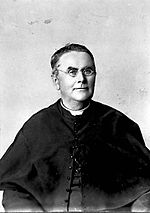Camille Lefebvre, Date of Birth, Place of Birth, Date of Death
TweetCamille Lefebvre
Canadian missionaryAbout Camille Lefebvre
- Camille Lefebvre, C.S.C.
- (14 February 1831 – 28 January 1895) was a Holy Cross father and vicar general for the Acadian population of New Brunswick, Nova Scotia and Prince Edward island (Maritime Canada). Born in Saint Philippe-de-Laprairie, Lower Canada, he was an itinerant primary school teacher before beginning religious studies in 1852, at the Congregation of Holy Cross at Saint-Laurent near Montreal.
- He was ordained a priest on 29 July 1855 at age 24.
- First appointed as assistant priest in the rural parish of Saint-Eustache, he afterwards taught at a business college in Saint-Aimé (Massueville) in the diocese of Saint-Hyacinthe.
- In 1863, Bishop John Sweeny of New Brunswick recognized a need to provide education to the French speaking Catholic population the Maritime colonies, as well as English-speaking Catholics of Irish and Scottish descent.Under Sweeny's mandate, in the fall of 1864 Father Lefebvre founded St.
- Joseph’s College in Memramcook, New Brunswick as a post-secondary centre of learning.
- It received a provincial charter in 1868 and became eligible for financial support from the government.
- However the funding only lasted until 1871 when New Brunswick passed its controversial Common Schools Act which attempted to secularize education in the province.
- In refusing to accept the requirements of the Act, Father Lefebvre forfeited future funding and as a result, the college remained in financial difficulties for the rest of its existence.
- Nonetheless, the college would make a significant impact within Acadian and English Catholic society by creating a necessary educated class.
- Father Lefebvre died on 28 January 1895.
- Three years later, the College was granted university status in 1898.
- The College remained open until the 1960s when it was absorbed into the University of Moncton.
- His life and work are commemorated at Monument Lefebvre where the college was founded, and where he died.
- His biographer was Pascal Poirier.
Read more at Wikipedia


 Date of Birth:
Date of Birth:  Place of Birth: Montérégie, Quebec, Canada
Place of Birth: Montérégie, Quebec, Canada